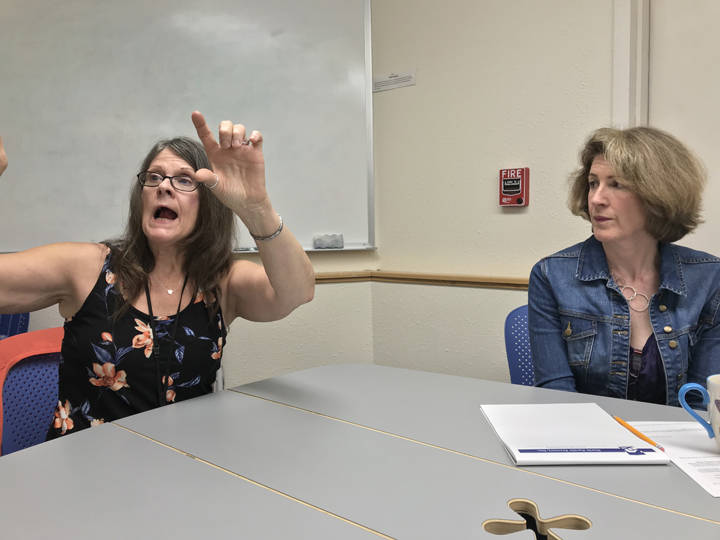Even when Pam Muelleriguy really wanted to see a newly-released movie, she could not. Muelleriguy suffers from hearing loss and said she would not go to the movie theater because she could not hear the movie and there was no closed captioning.
On Mother’s Day this year, that changed. On that day, Glacier Cinemas implemented closed-captioning devices that allow those who are deaf or hard of hearing to enjoy movies in the theater.
“It is very important for people who are deaf or have hearing loss to have this,” Muelleriguy said at the Southeast Alaska Independent Living building recently. “We never would come to the movie theater. We would wait until the DVD would come out.”
Muelleriguy said she and others who have hearing trouble has been asking local theaters to have closed captioning devices. Through their efforts, they finally succeeded. The theaters offer an area with closed captioning monitors that connect to the chair’s cup holder. Those who are using the device can read the closed captioning right in front of them. The closed captioning devices also feature a headphone unit that can be used by those who are visually impaired. The headphones give a description of the scenes as well as the dialogue in the movies.
According to the U.S. Department of Justice Civil Right Division, by June 2, 2018, any movie theater that was showing digital movies on Dec. 2, 2016, must have made available and maintained the equipment necessary to provide closed movie captioning and description at a movie patron’s seat. This rule is relegated to theaters that show digital projection or show digital and analog projected movies. It does not include theaters that show only analog projected movies. Gold Town Nickelodeon is an example of a theater in Juneau that is exempt because of that. The rule also exempts theaters who cannot afford the devices if it is determined to be an “undue burden” to the theater.
Kenny Solomon-Gross, Gross Alaska Inc. vice president and general manager, said the company first started using the closed captioning and listening devices at its Ketchikan Coliseum Theatre location in October 2017. The installation of the devices was completed in April at 20th Century Theatre and Glacier Cinemas in April before being introduced to the public in May. Solomon-Gross said the company looked at several different devices before choosing the ones they use. The devices, including the transmitter, cost about $15,000, Solomon-Gross said. Since acquiring the devices, Solomon-Gross said there has a been an extremely positive reaction.
“We are always trying to be an all-welcoming company and everybody should be accepted here,” Solomon-Gross said at 20th Century Theatre Monday. “We are able to provide entertainment for as many people as possible in the community.”
Sherri von Wolfe, Accessibility Specialist & Independent Living Advocate at Southeast Alaska Independent Living, said SAIL’s involvement mostly is attributed to Muelleriguy, who works there. Her relentless pursuit of getting the devices in the theater, von Wolfe said, is the reason why they are there. SAIL supports people who are aging or living with a disability. According to von Wolfe, SAIL will hear from businesses on what they can do to be more accessible. For businesses that are not yet Americans with Disabilities Act compliant they must have a plan of action stating how they are going to get there, von Wolfe explained.
“We understand, and the law understands, that it can be difficult, but you do have to have a plan on implementing it,” von Wolfe said.
While trying to make all businesses fall within the ADA guidelines can be difficult, von Wolfe said the theaters’ compliance with the law is a good start.
“I think what Pam was trying to do is highlight the good efforts (of the theater) towards the goal,” von Wolfe said. “I think we are not 100 percent there yet, but this is really great that (the theater) responded.”
• Contact reporter Gregory Philson at gphilson@juneauempire.com or call at 523-2265. Follow him on Twitter at @GTPhilson.

